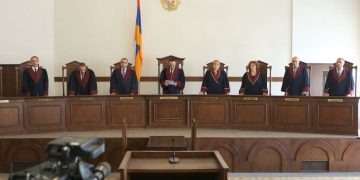When talking about the latest constitutional amendments on RFE / RL’s Sunday Analytical, Alvina Gyulumyan, who claims to be still a judge of the Constitutional Court, said on June 28 that the Constitutional Court could not annul the previous disputed elections, as there was no evidence in protests against them.
“This does not refer to the past, what we have done, but I have had many opportunities to talk about the past. Other people blame their unfinished work on the Constitutional Court. If your representatives in the election commissions did not write a special opinion on the protocol, if your proxies did not apply to the court, on what basis should the Constitutional Court have declared those elections invalid?” Gyulumyan said.
Alvina Gyulumyan also referred to the decision of the National Assembly not to apply to the Constitutional Court to verify the constitutionality of the draft constitutional amendments, which was justified by the existence of conflict of interest, and noted that in that case the National Assembly could simply have changed the relevant norm.
The Fact Investigation Platform tried to find out whether there was a possibility to change the constitutional norm, which obliges to apply to the Constitutional Court, and whether there was really no evidence in the applications to the Constitutional Court, following the example of the 2003 presidential election.
Disputing election results
Artashes Geghamyan appealed the results of the first round of the 2003 presidential election, and Stepan Demirchyan disputed the results of the second round of election. In one of the cases, Alvina Gyulumyan was the rapporteur of the Constitutional Court, and as a result, two decisions were made, namely, SDO-408 and SDO-412.
According to the decision of the Constitutional Court, Artashes Geghamyan substantiated the existence of violations with “documents attached to the application, written explanations of eyewitnesses, as well as evidence recorded by foreign observers.” It was claimed that in a number of cases the rights of proxies of presidential candidates had been violated.
Although the Constitutional Court noted the shortcomings in the control over the legitimacy of the elections, the lack of a timely response to the complaints, the lack of an adequate response to the violations observed by the OSCE observation mission, it nevertheless rejected Geghamyan’s appeal to annul the election results.
According to the other decision of the Constitutional Court, the following documents were attached to Stepan Demirchyan’s application to annul the election results submitted to the electoral commissions and the Prosecutor’s Office – applications, complaints, protocols prepared by some proxies, copies of protocols of Territorial Electoral Commissions, lists of absent and deceased persons, copies of proxies’ certificates, citizens’ passports, ballot papers.
Despite that, the Constitutional Court rejected the application, but at the same time suggested that referendum on no-confidence for the newly elected National Assembly and the President be held within a year, as ballot stuffing, miscalculation of votes, voting instead of others and other essential violations had been legally justified.
The Constitutional Court’s proposal to hold a no-confidence referendum was not implemented within a year.
It is noteworthy that the ban on the publication of the lists of voting participants was imposed by the Constitutional Court itself, by the decision SDO-412 of 2003, which the applicant considered legal protection of electoral fraud.
According to the Constitutional Court, the publication of the lists would lead to a violation of the secrecy of the ballot. Meanwhile, the applicant was convinced that this gave the authorities an opportunity to make additions to the number of voters who did not immediately participate in the voting, and, accordingly, to open a window for impossibility of control through ballot stuffing.
Such a position of the Constitutional Court called into question the transparency of the subsequent electoral processes, and only on the day after the April 2, 2017 elections to the National Assembly were the voter lists published, after which the OSCE / ODIHR noted in its report that the publication of voter lists was a crucial way to prevent voting instead of another person despite the fact that voters’ personal data was disclosed.
Thus, with only one illustrative example, we can conclude that Alvina Gyulumyan’s assertion that there was no evidence to support disputing election results does not correspond to reality. Another question is whether they were sufficient to annul the election results.
A change in the mandatory norm of applying to the Constitutional Court is possible only through a referendum
According to Alvina Gyulumyan, along with the introduced amendments, the National Assembly could have changed the mandatory norm of applying to the Constitutional Court. “Look what they say now. They say, “How could we apply to the Constitutional Court on the amendments to the Constitution, if there is a conflict of interest here.” Then change that constitutional norm, which obliges to apply to the Constitutional Court, and envisage that exception.” After all, it is an imperative norm. If you were changing this norm, you should have changed that one as well,” she said.
According to Article 169 (2) of the Constitution, the National Assembly addresses the Constitutional Court on issues related to the amendment of the Constitution, and Article 168 (2) of the Constitution stipulates that before the adoption of the draft amendments to the Constitution, as well as the adoption of the draft legal acts to be put to a referendum, the Constitutional Court shall decide on their compliance with the Constitution.proceeds in accordance with the procedure established by the Law on the Constitutional Court.
It should be noted that the above-mentioned Articles 168 and 169 are included in Chapter 7 of the Constitution, which, according to Article 202 of the Constitution, can be amended only through a referendum.
As for the claims of the opposition that by making an amendment to Article 213 of the Constitution, the National Assembly, in fact, made changes in issues regulated by Chapter 7 of the Constitution (formation of courts, etc.), which it did not have the right to do and it could only be done through a referendum, it should be noted that Article 202 of the Constitution allows the National Assembly to make amendments in Article 213.
By the way, the leader of the “Bright Armenia” faction Edmon Marukyan asked the government in February why they do not solve the issue of the Constitutional Court in the National Assembly and through another referendum.
Thus, the claim of former member of the Constitutional Court Alvina Gyulumyan that the National Assembly could have changed the mandatory norm of applying to the Constitutional Court, if it thought that there was a conflict of interest, is manipulative, as it is possible to change the mandatory norm of applying to the Constitutional Court only through a referendum. According to Article 208 of the Constitution, it cannot be done during a state of emergency.
Nelli Lazaryan

 FACTOMETER
FACTOMETER









